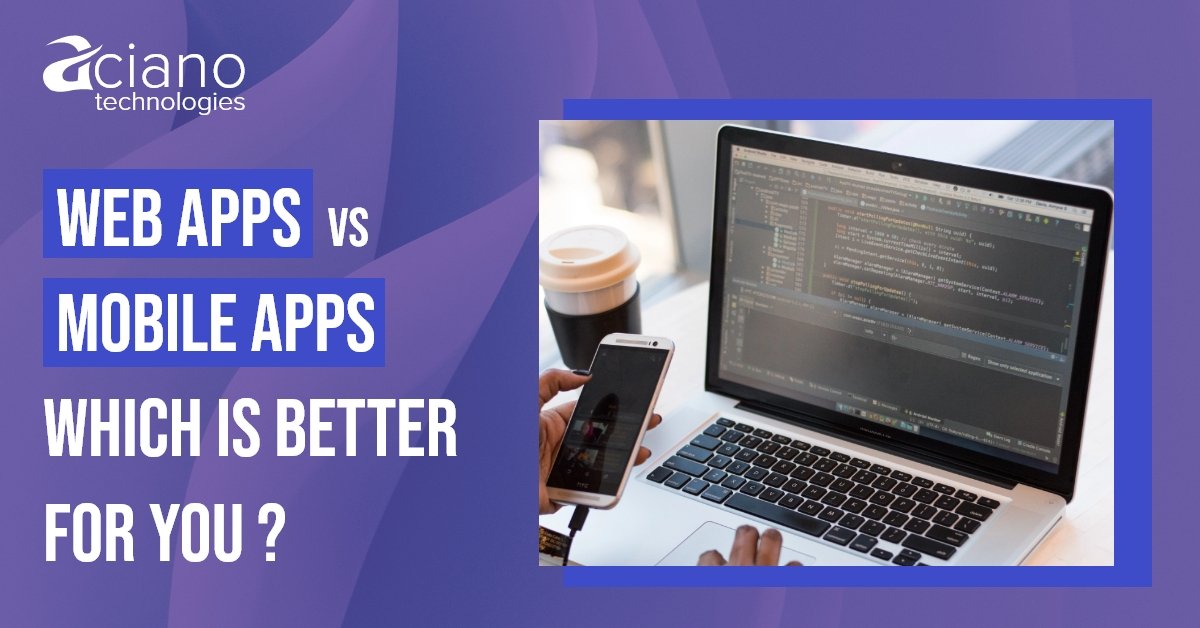It's a popular fallacy that mobile and web application development are interchangeable, but they're actually extremely distinct. So, it's crucial to avoid confusing the two. Because there are variations between them not just for the user but also in the development and deployment processes.
Making a successful digital product requires a thorough understanding of the distinctions. This essay will explain the distinctions between mobile vs web app development. Additionally, you will learn information that will aid in your decision as to whether to develop a web app or a mobile app. Let's look at the differences between web applications and mobile applications.
Mobile Vs Web App Development
What is a Web Application?
A web application (web app) is an application program that is maintained on a remote server and made available via the internet using a browser interface. They are produced by web development services providers for a variety of clients, including both businesses and private citizens. Common web apps include things like webmail, online calculators, and online shops. The majority of online applications are accessible through all browsers, while some are only through a particular browser.
Web Application Development
Web application development involves a mix of frontend and backend technologies. The most widely used front-end technologies are HTML, CSS, and JavaScript. Backend technology, however, might differ greatly. However, Node.js, Python, Ruby on Rails, and Java are a few of the more prominent ones.
There is no standardized software development kit for developing web apps, in contrast to mobile apps.. In addition, web development is frequently quicker and simpler than developing a mobile app, but its feature sets are far more constrained.
Programming Languages for Web Application Development
For web application development the developers use particular programming languages to ensure a seamless and error-free browsing experience. Among them are:
Python
Javascript
Java
PHP
Swift
Kotlin
Ruby and many others.
How Does a Web Application Work?
The fact that user does not need to install web applications as a separate program on the desktop and they can access them via browser in the following ways is one of the distinctive features that sets them apart from mobile applications.
Through a browser and the internet, the user sends a request to the web server
The server gets the request and gets ready to send the specified request after that
Later, the web application server sends the server the results of the information request
The user's requested information is then shown by the web server
Examples of Web Applications
There are a tonne of web applications that we use every day without even being aware of them. Among them are:
Online shopping carts
Word processors
Email
Photos and videos editing
Scanning of files
Spreadsheets
Presentations
What Is a Mobile Application?
A mobile application is a software program designed for mobile devices, such as smartphones, tablets, or wearable technology. Typically, it is obtained from an app store or marketplace, like the Apple App Store or Google Play Store, and downloaded and installed from there.
Users can use them for a variety of things, including entertainment, communication, productivity, and access to information and services. They are designed for a particular mobile operating system, like iOS or Android. Or they might be web applications that run in a mobile device's web browser.
Mobile Application Development The creation of mobile apps often uses Native and Hybrid development methodologies.
The creation of mobile apps often uses Native and Hybrid development methodologies.
Native Mobile App Development
Building apps exclusively for a given mobile platform, such as iOS or Android, is known as native app development. To create these applications, the developers use platform-specific programming languages and app development tools. This contains Java and Android Studio for Android or Swift and Xcode for iOS. This makes it possible for developers to produce programs that make use of the distinctive features of each platform. As a result, user experience better performance. However, the development of a native mobile app takes more time and money because it requires different codebases for each platform.
Hybrid Mobile App Development
Hybrid app development, in contrast, integrates the greatest elements of both online and native apps. It is set up in a manner comparable to native apps. But when users use it, the platform's WebView enables it to function as a web app. In general, hybrid apps are cheaper to produce and take less time to develop. Because they can be developed once and implemented across various platforms. Hybrid apps, however, might not deliver native apps' level of performance and user experience.
In both situations, the creation of an app often entails designing its user interface, programming its logic, integrating it with backend services, testing it, and submitting it to the appropriate app stores for distribution. The mobile app creator may use a variety of tools and platforms to facilitate the app-building process. This includes IDEs, analytics tools, emulators, and code editors.
Programming Languages for Developing Mobile Applications
Mobile applications offer an optimal performance that is customized to user preferences. They feature a vibrant and dynamic user interface (UI). The programming languages used to create mobile applications are as follows:
Python
HTML
CSS
Javascript
Java
Kotlin
C++
Swift
C#
Dart
How Does a Mobile Application Work?
Mobile applications lead more quickly and provide users with a more upscale browsing experience. In addition, they do not always require Internet and operate as follows:
When using an iPhone or an Android phone, the user downloads the application from the app store or the google play store, respectively
A specific amount of information and storage space is needed to download the application. The download procedure begins after confirming that the mobile device has enough space to hold the application
The user must either register or enter their login information after downloading in order to access the applications
The application is now prepared to deliver its services and display its content, all while enhancing the user experience
Examples of Mobile Application
Every day, a sizable number of users download mobile applications from app shops. Among them, a few of the most well-liked mobile application categories are:
Lifestyle
Social media
E-commerce
Utility
Games
Educational
Communication
Entertainment
Productivity
News
Mobile vs Web App Development - Which One Should You Choose?
Your ultimate objectives will determine whether you should develop a web app or a mobile app solution. You should choose mobile apps if you want an app for games or other stand-alone programs. In contrast, because everyone with a web browser may use a website, you can reach a larger audience. Additionally, web development also gets rid of the concern over device compatibility.
Another advantage web application development have over mobile apps is the capacity to provide more dynamic updates. After you publish your changes to the web server, all users of that web application will immediately receive your updates. As an alternative, you must wait for customers to download the new version of mobile apps before allowing them to benefit from the changes.
Join hands with Aciano Technologies
Get in touch with Aciano Technologies, a well-reputed software house in Asia, right away if you'd like to construct a web application or a mobile app. We can help you make the right decision for your business.




